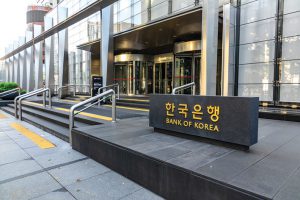South Korea is redoubling efforts to shore up the local credit market as yields surge to decade highs and default risks spread, extending efforts to support markets after the country already stepped in earlier this year to slow a tumbling won.
Authorities will swiftly resume buying corporate debt via a 1.6 trillion won ($1.1 billion) bond stabilisation fund established at the outset of the pandemic, and will prepare to increase its size, the Financial Services Commission (FSC) said. The statement did not list a sum for the increase but said it’d be via a “capital call,†which would typically involve tapping banks, brokerages and insurers for additional money.
The announcement constitutes yet another instance of officials in the country taking action to calm markets this year and comes just a few weeks after a rare default on commercial paper by the developer of Legoland Korea theme park in Gangwon province. That missed payment stoked unease and, along with aggressive interest rate hikes by the Bank of Korea, contributed to a surge in borrowing costs.
Yields on Korean commercial paper have skyrocketed to a level last seen during the global financial crisis and sales of new corporate won bonds have plunged this month to the lowest on record for the period, according to Bloomberg-compiled data going back to 1999.
Authorities will closely monitor market unease that’s spread due to concerns about project financing asset-backed securities related to Gangwon province, the FSC also said. In a separate statement, officials also said they’d grant more leeway on regulatory liquidity for banks until the end of June.
According to NICE Investors Service, at least about 9.6 trillion won of asset-backed securities for project financing need to be refinanced by the end of this month.
Korea’s bond market dislocation takes place against the backdrop of a global market selloff, as central banks raise interest rates to dampen inflation even at the expense of an economic downturn.
The Bank of England was forced to intervene after the UK government’s spending plans triggered a historic plunge in gilts last month. Such gyrations mean investors are staying on the sidelines, while rising borrowing costs have left companies reluctant to sell new debt.
Yet the developments in Korea have been particularly acute. The yield premium on won corporate notes more than doubled this year to the highest since at least 2010. By contrast, for Asia dollar bonds the metric has only risen roughly 40%, Bloomberg-compiled data show.
The fund’s bond purchases would likely stem a further widening in spreads but weren’t likely to reverse the increased thus far, said Kim Eun-gie, credit analyst at Samsung Securities Co.
—Bloomberg
 The Gulf Time Newspaper One of the finest business newspapers in the UAE brought to you by our professional writers and editors.
The Gulf Time Newspaper One of the finest business newspapers in the UAE brought to you by our professional writers and editors.
